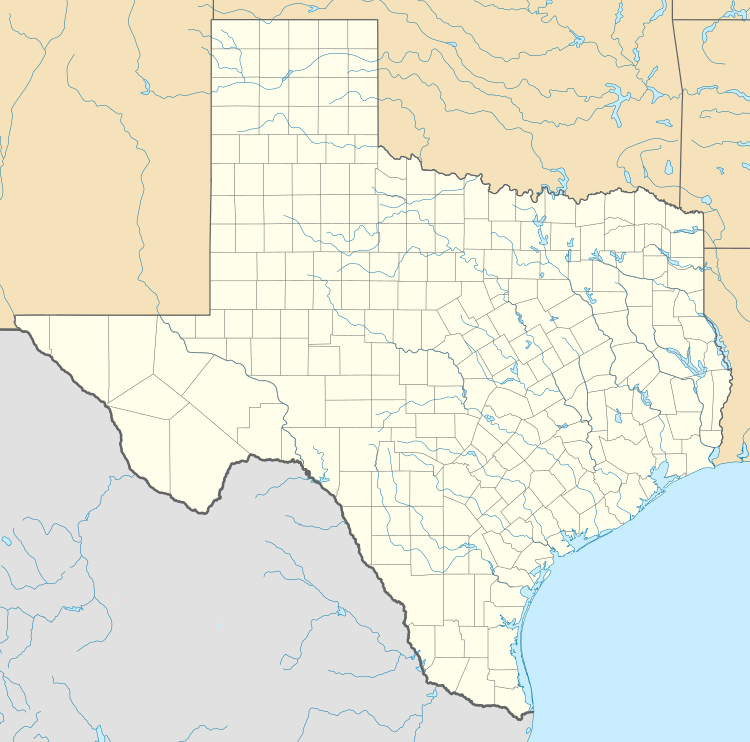Shankleville, Texas
| Shankleville | |
|---|---|
| Unincorporated community | |
 Shankleville  Shankleville | |
| Coordinates: 30°58′13″N 93°42′25″W / 30.97028°N 93.70694°WCoordinates: 30°58′13″N 93°42′25″W / 30.97028°N 93.70694°W | |
| Country | United States |
| State | Texas |
| County | Newton |
| Elevation | 217 ft (66 m) |
| Time zone | UTC-6 (Central (CST)) |
| • Summer (DST) | UTC-5 (CDT) |
| GNIS feature ID | 1380524[1] |
Shankleville is an unincorporated community in Newton County, Texas, United States.[1] It was founded as a Freedmen's town,[2] one of over 500 such “freedom colonies”[3] in Texas.[4]
History
Shankleville was founded in 1867,[5](subscription required) and is named after James "Jim" and Winnie (Brush) Shankle, the first African Americans to purchase land and become leaders of the settlement after Emancipation.[6]
The Shankles bought "a league" of land and founded the community of Shankleville.[7] They invited other families to live there and create businesses, amassing land holdings over 4,000 acres.[8] The settlement prospered and included schools, churches, cotton gins, saw mills, grist mills, sugarcane mills, stores, and blacksmith shops.[9] Schools included the LoneStar school, the Enterprise School and McBride College, a normal school named for Stephen Alexander McBride, a co-founder of Shankleville (and the Shankles’ son-in-law).[10] McBride College was a two-story structure which operated from 1883 to 1909. It also served as a community center and town hall. During summer, teachers came there to attend training conferences and seminars. When school was not in session, McBride College was also used to host revivals featuring traveling preachers.[11]
McBride gave the land for the Shankleville Community Cemetery (his mother Hannah McBride and he are buried there), and for one of the three churches, the Shankleville Church of God. A Texas State historical marker also commemorates McBride and the contributions he made to Shankleville.
Jim and Winnie are buried in the Jim Shankle cemetery, which was established for them and their descendants.
Preservation and Conservation
The descendants of Shankleville are involved in historic research, community preservation,[12] and family genealogy.[13] Annual homecomings have been held since 1941 on the first weekend of August each year.[14][15]
The Shankleville Historical Society was founded in 1988 to "preserve the heritage", "document the history", and "propagate the legacy" of Shankleville. The society hosts many cultural events in honor of Shankleville, including the annual Texas Purple Hull Pea Festival[16][17] which celebrated its sesquicentennial homecoming in 2017. The festival features cultural events commemorating different historical aspects of the settlement. Purple-hull peas were a historic cash crop and staple of the local economy.[18](subscription required)[19][20][21][22][23]
References
- 1 2 U.S. Geological Survey Geographic Names Information System: Shankleville
- ↑ "African Americans In Texas: A Lasting Legacy" (PDF). Texas Historical Commission.
- ↑ "Addie L. & A.T. Odom Homestead - Preservation Texas". www.preservationtexas.org. Retrieved 2018-08-06.
- ↑ "THE TEXAS FREEDOM COLONIES PROJECT ATLAS & STUDY". spark.adobe.com. Retrieved 2018-07-16.
- ↑ Roberts, Andrea (2017-11-17). ""A Conversation" and "Portals to Freedom or Researching in Limbo Time"". UTSOA Platform 2017: Convergent Voices: 10.
- ↑ Texas Historical Commission (2014-10-08), The Story of Shankleville, retrieved 2018-07-14
- ↑ "Confronting Urban Design's Diversity Crisis With a Return to Black Places". nextcity.org. Retrieved 2018-07-14.
- ↑ "Your Family Tree". Houston Chronicle. 2004-06-19. Retrieved 2018-08-06.
- ↑ ROBERT, WOOSTER, (2010-06-15). "SHANKLEVILLE, TX". tshaonline.org. Retrieved 2018-07-14.
- ↑ "The Epic Love Story Behind This Family's Famous Cookie Recipe". Country Living. 2016-09-19. Retrieved 2018-08-06.
- ↑ http://www.toledo-bend.com/fd/, Frank Dutton -. "Shankleville History - Newton County Texas". www.toledo-bend.com. Retrieved 2018-07-14.
- ↑ "shankleville Texas historical society presents purple hull pea festival 2014". Scrumptious Chef. 2014-06-20. Retrieved 2018-07-16.
- ↑ Johnson, Brittney (February 2014). "The Community That Love Built: Shankleville" (PDF). Deep East Texas Electric Co-Op.
- ↑ Texas Historical Commission (2015-09-17), Shankleville's Homecoming, retrieved 2018-07-14
- ↑ "Upcoming Events Purple Hull Pea Festival & Symposium, Shankleville Texas". tonitiptonmartin.com. Retrieved 2018-07-16.
- ↑ Andrea Roberts (2014-06-26), Purple Hull Pea Festival Held at Settlement Founded by Ex-Slaves in Shankleville, TX., retrieved 2018-07-14
- ↑ 12NewsNow (2018-06-24), 12News pea competition in honor of the 'Texas Purple Hull Pea Festival' in Shankleville, retrieved 2018-07-14
- ↑ "Fifth annual Purple Hull Pea Festival gets underway on Friday". The Lufkin News. Retrieved 2018-07-16.
- ↑ "Purple Hull Pea Festival is June 25th!". Edible Houston. Retrieved 2018-07-16.
- ↑ "Texas Purple Hull Pea Festival is Coming to a Community Near You". The Newton County News. Retrieved 2018-07-14.
- ↑ "Turn out good for Texas Purple Hull Pea Festival in Shankleville". KJAS.COM. Retrieved 2018-07-16.
- ↑ "Texas Purple Hull Pea Festival w/ Sis Lareatha Clay". BlogTalkRadio. Retrieved 2018-07-16.
- ↑ Bashaw, Robert (June 19, 2016). "TEXAS PURPLE HULL PEA FESTIVAL - JUNE 27TH". East Texas Press.